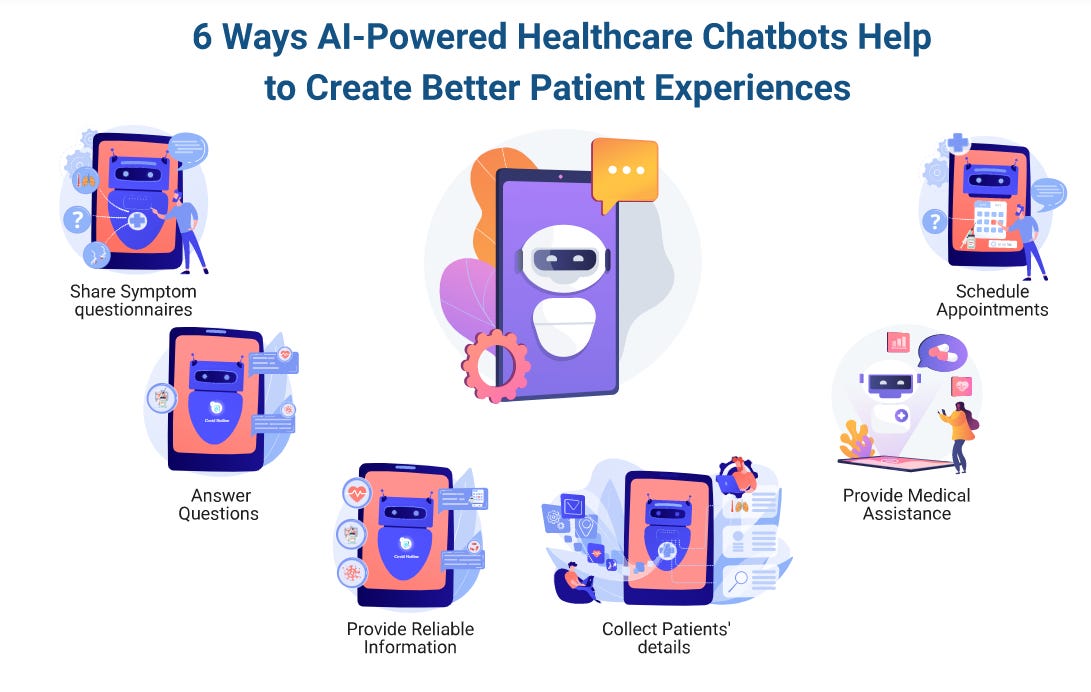Chatbots: New phenomena in improving Patient Experience
According to a Meticulous Research report, the global healthcare chatbots market is expected to reach $703.2 million by 2025.
In the time of the global pandemic, AI has helped the global healthcare industry to navigate the novel and unknown. Today, the Global Healthcare Chatbots Market size is estimated to expand at a CAGR of 21% through 2030.
During the COVID-19 outbreak, in healthcare, giving patients, their relatives, or other website visitors a seamless and effective way to answer questions, provide information regarding the availability of the facilities, get-in-touch with the medical support team, and even book appointments without calling in is a win-win situation.
And thanks to the perfect amalgamation of artificial intelligence (AI) and healthcare chatbots, the healthcare industry has managed to not only stay connected with the public but also save a tremendous amount of money, time and effort.
Chatbots are conversational software that is available either via standalone apps or web applications. These conversational agents mimic human speech to simulate a human conversation. The technology uses natural language processing (NLP) that recognizes the voice and interprets what the user is saying using algorithms.
With dramatic developments in artificial intelligence and machine learning, chatbots have immensely become popular across various sectors. Already virtual assistants like Google now, Microsoft’s Cortana, and Apple’s Siri are making many buzzes. Thanks to their smart intelligence, responsiveness, and usefulness, that supports the fact that chatbots are here to stay. The popularity is likely to grow in the near future with further advancements and implementation.
Chatbots in Healthcare – Implications and Possibilities
Hundreds of companies are building solutions to help everyone be more organized, especially when it comes to healthcare. And one of the leading developments in the space is medical bots.
In essence, these are personal assistants that track doctor’s appointments, remind patients to take medication, help people improve their diet, even suggest exercise plans — but they’re not just patient-focused.
In fact, some of these chatbots are sophisticated enough to provide empathetic and supportive care, creating an experience that helps patients feel valued, validated, and heard, which is why they’re now acting as:
Hospital administrators
Healthcare consultants
Elderly care providers
Self-care coaches
Emergency alarms
5 advantages of using chatbots in healthcare
AI-powered bots can boost healthcare in many ways, but the five most talked-about advantages revolve around:
Access: chatbots make medical advice available 24-7, helping patients find the information they need, even if a practice is closed.
Scalability: chatbots can handle upwards of 1,000 interactions in parallel, meaning no limits on patient support.
Fewer no-shows: on average, a missed appointment costs medical practices $200, but a digital assistant can significantly reduce no-shows by sending reminders.
Automated record keeping: chatbots are great at taking notes, giving doctors more time to care for their patients.
Cost-savings: Juniper Research estimates that annual savings derived from adopting chatbots in healthcare will hit $3.6 billion by 2022.
Medical chatbots — use cases
Scheduling appointments (and sending reminders)- Chatbots can ease the strain by triaging multiple patients at once, referring those who need specialist care to the doctor. The chatbot can then handle the booking process, allowing patients to choose a doctor, pick a time, enter personal data, even add symptoms to help the doctor know the context before the visit.
Evaluating Symptoms- Chatbots with NLP interpret the input, regardless of the data supplied. And by analyzing the information, the bot helps patients narrow down the cause to potential conditions before recommending the next steps.
Tracking Health- Bots can gather detailed records of how conditions evolve, helping doctors assess a prescription’s effectiveness. Overall, chatbots make prescriptions simpler for all, ensuring patients receive the correct medication with proper dosage and the right instructions.
Online payments- By offering streamlined online payments, supported by a chatbot, healthcare providers can significantly reduce patient billing queries — all by helping patients understand their invoices, address related questions, and process payments in one place.
Mental health assistance- Chatbots can provide mental health assistance by offering cognitive-behavioral therapy (CBT) to people with post-traumatic stress disorder (PTSD), anxiety, or depression. They can also help people with autism improve their social skills via text, webcams, and microphones. Bots have even been used to provide meditation sessions and Dialectical Behaviour Therapy (DBT).
Healthcare chatbots enable hospitals, healthcare centres, and clinics to increase their potential reach and brand awareness by solving queries and engaging customers in the digital communication channels they frequent most.
Considering the current scenario, it is not necessary to receive all questions related to symptoms. Nowadays most people often search for information on drugs, vaccines, and medical equipment like ambulance services, where to source oxygen cylinders from, availability of beds, etc. In such a scenario, chatbots can help the hospitals to provide that information at the point of care. Healthcare chatbots can also equip hospitals and clinics to automate routine tasks such as providing and confirming referrals, performing research surveys, paying bills, and verifying important information like insurance coverage.
This way, the chatbots help hospitals and healthcare centres to build trust and long-term relationships by creating better patient experiences.
With this, it is safe to say that the coming years will see the most definitive transformation of chatbot platforms into conversational AI platforms. This will not only improve care delivery but will also lead to significant healthcare cost savings and improved patient care outcomes in the near future.
Source for stats:
https://getreferralmd.com/2019/03/11-healthcare-chatbots-that-improve-patient-experience/
https://routemobile.com/media_coverage/enhance-patient-experience-with-ai-powered-healthcare-chatbots/



